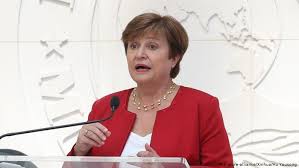The International Monetary Fund (IMF) and the European Commission (EC) have advised African leaders on the need to improve revenue generation, preserve debt sustainability and provide more consessional funding to reduce the current constraints on their countries given the high level of debt and fiscal constraints militating their developmental initiatives.
The Breton Woods finance institution’s Managing Director, Ms. Kristilina Georgieva and the European Commissioner for International Partnership, Ms. Jutta Urpilainen, gave this advice in a joint statement issued at the end of the Eleventh African Fiscal Forum titled ‘Building a Resilient Africa’.
The duo also advised leaders in the African countries on efficient utilization of funds in order to maximize the impacts of such disbursements on their citizens and build more resilience for the various economies.
The IMF noted that over the past three years, Sub-Saharan African (SSA) countries had contended with various adverse shocks, including the COVID-19 pandemic, climate change, spiking food and energy prices worsened by the Russia-Ukraine war, which worsened the living conditions of the people in the continent.
The two global bodies stated: “In the face of such shocks, many countries have been compelled to turn to short-term support measures, such as tax cuts, untargeted food or fuel subsidies, and price controls on specific goods. These measures, while necessary, have added to fiscal pressures amid growing debt vulnerabilities, forcing governments into difficult tradeoffs.
“While such shocks do require governments to step in and protect the most vulnerable, actions to gradually reduce fiscal deficits will be crucial in most countries to rebuild buffers, protect debt sustainability, and ensure macroeconomic stability”, they added.
Both organisations also advised the African governments on ways to reconcile the need to effectively respond to shocks with the aim to rebuild fiscal space and by so doing, contribute to building a more resilient Africa by shifting from broad-based subsidies to more targeted support to save valuable resources for funding development plans and investment.
In addition, they advocated efficient use of public fund to maximize its impact and build more resilience for the benefit of the economies.






